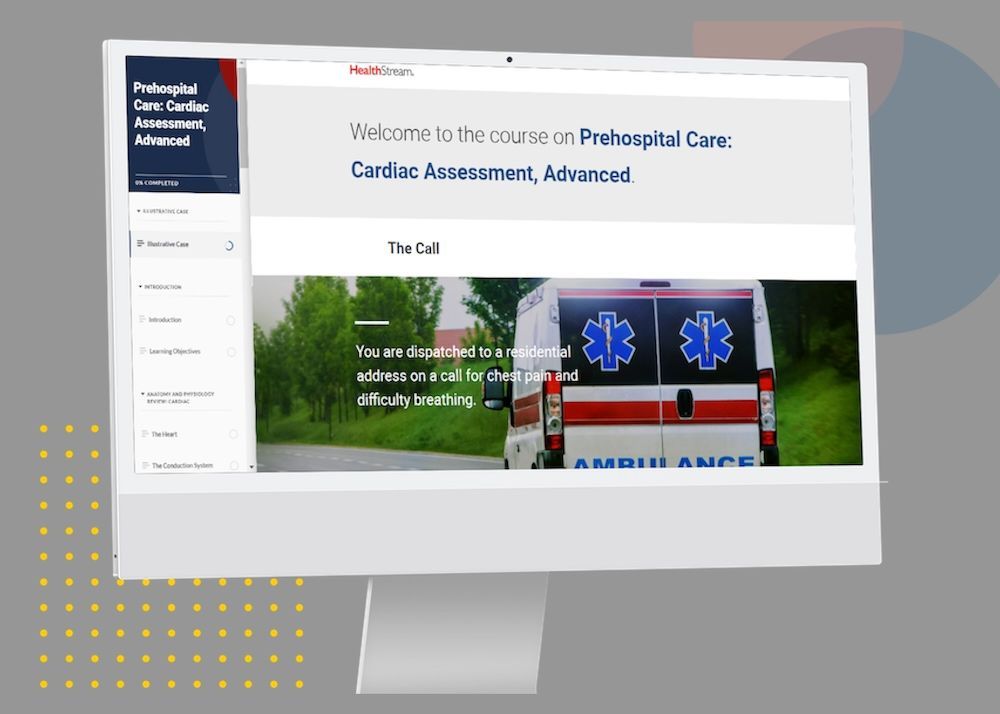HealthStream can help your organization optimize competency while reducing Emergency Management Services (EMS) training costs. EMS is no different from any other point on the continuum of care in that ongoing training to build competency, address changes in best practices, and to maintain credentials is a part of every pre-hospital provider’s career. EMS professional need practical and efficient ways to demonstrate competencies and maintain certifications. While restrictions on how EMS training is delivered have been removed, providers still need to be sure that they are getting training that will lead to competency while meeting Commission on Accreditation for Prehospital Continuing Education (CAPCE) requirements while also meeting the National Registry of EMT’s (NREMT)’s annual recertification requirements. This HealthySimulation.com article will discuss HealthStream’s EMS program.
As of September 2022, NREMT has permanently waived the limits on distributive education, giving these first responders more options when pursuing continuing education, recertification, state licensure, refresher, and re-entry training. The removal of these restrictions offers EMS providers and the agencies for which they work greater flexibility when pursuing education and can result in substantial cost savings for their employers. Limiting access to distributive forms of continuing education creates barriers that may hinder re-certifications. The new ruling is good news for pre-hospital providers as this removes those barriers to asynchronous distributive learning and creates better access to education for the nation’s emergency medical service providers.
View the LEARN CE/CME Platform Webinar How Clinical Simulation Is Driving the Next Wave of Resuscitation Education to learn more!
Removing requirements for synchronous, in-person training is an important first step, as this means that agencies will no longer need strategies to address the inherent difficulties in scheduling and executing in-person training for these first responders. EMS providers need a broad scope of knowledge that covers assessment and clinical skills as well as the critical thinking skills that will keep both them and their patients safe in the often chaotic circumstances in which they work.
EMS Training – The Challenges
While all professional training can be challenging, EMS training has a unique set of challenges. Firstly, there is a vastamount of information. Providers need to be taught assessment and clinical skills, critical thinking skills, as well as the state and federal requirements for their profession. Upon completion of their educational program, they will be expected to demonstrate those skills in situations that are typically stressful, chaotic, and sometimes dangerous. Another significant challenge is that the training period is typically fairly brief, given the large amount of information that must be learned and obtained. In addition, as with many healthcare jobs, EMS instructors are in relatively short supply, making in-person training even more of a challenge.
HealthStream Flexible Solutions for EMS Training
HealthStream’s EMS Program is easy to navigate and can be accessed from any device, which allows providers a convenient way to access education whenever and wherever they are. The program helps facilitators and faculty monitor performance and completion rates for students to ensure regulatory and organizational compliance. HealthStream’s EMS Program is a solution that offers flexible training solutions for EMS providers and is an affordable option that can help your organization attract and retain top talent. The program can be used to help fulfill your organization’s emergency training and recertification requirements. The comprehensive EMS Program covers each of the five NREMT categories:
- Airway, Respiration, and Ventilation
- Cardiology and Resuscitation
- Trauma
- Medical, Obstetrics and Gynecology
- EMS Operations
The HealthStream EMS program includes more than 70 hours of CAPCE-approved courses and includes an option for uploading your own courses so that you can address the unique needs of your community and department. Upon completion of the courses, students can complete an assessment to ensure that the material has been understood. In addition, the virtual format is a cost-effective means of education.
HealthStream Efficient and Cost-Effective Solutions for EMS Training
HealthStream’s EMS Program is designed to meet recertification requirements for all EMS personnel. The 70 hours of CAPCE-approved courseware is available on an easy-to-navigate platform that can be accessed anywhere on any type of device. In addition to the existing CAPCE-approved content, the program also offers users the option to create their own content that can help agencies address the unique requirements of their organizations and/or municipalities.
HealthStream takes the guesswork out of record-keeping. Managers can monitor and document individual and department-wide progress through the solution’s easy-to-use reporting features. The solution is comprehensive and cost-effective. Leaders can be confident that:
- they are not overspending to keep their EMS providers properly trained and re-certified
- they are using the best, most up-to-date material available
- they have eliminated barriers to training by offering a solution that is easy-to-navigate, and accessible anywhere at anytime
- they are offering training that will help them attract and retain talent
More About HealthStream
HealthStream is an information technology and services company dedicated to improving patient outcomes through the development of healthcare organizations’ greatest asset: their people. The company’s unified suite of solutions is contracted by, collectively, approximately 4.8 million healthcare employees in the U.S. for workforce development, training and learning management, talent management, credentialing privilege, provider enrollment, performance assessment, and managing healthcare simulation-based education programs.
HealthStream has received 15 Brandon Hall Excellence in Technology Awards for 2020. These honors demonstrate HealthStream’s ongoing commitment to technological innovation in healthcare workforce development, as well as the ultimate goal of improving healthcare outcomes. The Smithsonian also presented HealthStream with the Computerworld Smithsonian Medallion in recognition of the company’s achievement in their innovative use of technology to empower and advance society.
HealthStream works with organizations at every stage to establish a road map that fulfills requirements and ensures successful outcomes. The company’s solutions are divided into seven categories: learning and performance, quality and compliance, reimbursement, resuscitation, clinical development, credentialing, and scheduling and capacity management. Through the use of these solutions, professionals can cultivate a culture geared toward consistent and engaged learning through exclusive content from healthcare’s most respected leaders.








